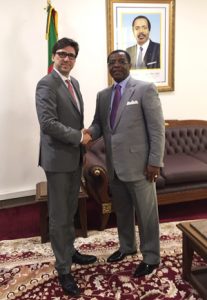How to Do Business with the African Development Bank

Identify Projects with Potential Opportunities
In most cases, it is not possible for companies to propose a project to the AfDB for funding (private sector projects are the exception). Rather, companies need to identify projects that are either under development or have been approved and that may need their products and services.
- Project and Procurement Notices are published on the bank’s Web site at www.afdb.org. These notices provide information for business seeking procurement opportunities stemming from AfDB-financed projects. Companies can sign up for projects and procurement alerts through description and status, the names of the executing agency and AfDB team leader, financial data, and project documents, is also available on the Web site under “Procurement”. Pipeline projects are listed in the AfDB Business Bulletin, also available on the Web site: www.afdb.org/en/documents/project-related-procurement/afdb-business-bulletin/The monthly AfDB Business Bulletin contains information on projects in the pipeline, recently approved projects and general and specific procurement notices. This information may already out of date by the time of publication, so the Bulletin should not be used as the sole source of market intelligence. Interested companies may also register at the AfDB’s website (www.afdb.org/en/register/) to receive procurement notices and project appraisal documents via email or, RSS feed (www.afdb.org/en/rss-feeds/).
- Press releases, describing all approved AfDB loans and other bank-related events, are posted on the Web site and are available by subscription.
- U.N. Development Business, published by the United Nations, lists loans and technical cooperation projects funded by the AfDB. It is available twice a month, while the electronic versions continuously updated and has search capabilities. A subscription fee is charged for both versions. For more information on this document, go to www.devbusiness.com
Identify Specific Tenders
- Investigate Leads
Project identification usually begins with proposals from the borrowing country, requesting funds for a specific project that will help achieve the development objectives outlined in the country’s development plans. The Bank also takes an active role in searching for potential projects, which must be in line with its assistance strategy as set out in the Country Strategy Paper.
Once companies have identified projects with potential opportunities, the next step is to investigate leads on specific tenders, or requests for expressions of interest. While tenders above certain amounts are publicly advertised, in most cases the response time is only 30 days. Therefore, it is important for companies to obtain as much information as possible about these opportunities before they are officially announced. As with researching projects, there is no single best way to obtain this information. The main sources of information are projects documents and key AfDB and executing agency staff.
Identifying opportunities in AfDB projects is not a simple matter: different donors may be involved, consulting needs change over time and public information on projects is often lacking. Opportunities to provide services for larger assignments are usually advertised, but information on short-term consulting requirements can often be obtained only from AfDB or donor agency staff, or from government officials.

Edgard Alain MEBE NGO’O, Minister of Transport, during FIT/CBL-ACP
mission to Cameroon in February
- Read Project Documents
Once a project is approved by the board, an “Appraisal Report” is posted on the Web site. The document provides detailed country and project information, including project timeline, financing, and contact information.
- Network for Critical Information
Companies can maximize their chances of receiving a contract award by working jointly with a business representative from borrowing country. Most of the planning and implementation work for a project is dine locally and tender documents often require companies to demonstrate experience in and knowledge of the borrowing country. A local partner or representative can help you with marketing to the customer, obtaining business information, understanding the customer’s need, and providing better service to the customer.
Local AfDB Country Offices can also provide some suggestions on potential local partners. Contact information can be found on the AfDB’s Web site under “Contact”.
- Learn the Language
Though both English and French are official languages of the bank, companies looking for AfDB business should be prepared to work in both these languages as well as Arabic, Portuguese, and other local languages.
Procurement Process
Under AfDB rules, bidding on AfDB-funded projects is restricted to companies from AfDB Group member countries, or to state participants in the African Development Fund.
The responsibility for managing procurement rests with the borrower. However, the AfDB does review the procurement process at various stages. If it is satisfied with the way the procurement is being carried out, it issues a “non-objection,” which allows the borrower to proceed.
Learn the Procurement Rules
Companies are individuals bidding on AfDB-funded projects have both rights and responsibilities for participation, and it is important for companies to understand these when bidding. Two documents are essential for companies interested in bidding on AfDB opportunities: Rules of Procedures for the Use of Consultants and Rules of Procedures for the Procurement of Goods and Works. These sources outline the rules and procedures that borrowing agencies are required to use when procuring goods and services. They can be obtained on the bank’s Web site under “Consultants”.
The AfDB has published a set of standardized bidding documents that are available online. These documents can help companies prepare for bid requirements. All procurement-related documents are available on the AfDB’s Web site under “Consultants”.
In next CBL-ACP revue
Consultants for consultancy projects at AfDB, advice to prospective bidders and private sector of AfDB



